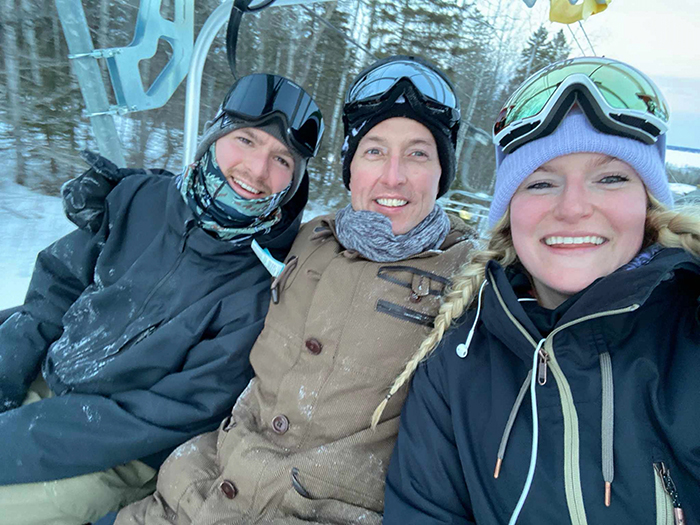Miosek brothers teaming up to complete MS 150
News | Published on June 4, 2024 at 5:20pm EDT | Author: frazeevergas
0
The active and outdoor lifestyles of brothers Elijah Miosek, left, and Michael, middle, were thrown for a loop when the newest member to the family, Elijah’s fiancé Emily Zeimet, right, was diagnosed with muscular dystrophy in late 2023.
By Robert Williams
Editor
A decade ago, the Forum covered Mike Miosek, a 2000 graduate of Frazee-Vergas High School, in his first attempt at completing the MS 150, one of a series of Bike MS rides, the largest Muscular Dystrophy (MS) fundraising cycling series in the world. ¶ This year, Mike will be joined by his brother Elijah, who decided to ride after his fiancé Emily Zeimet was diagnosed with MS last November. ¶ “It hit home pretty hard,” Elijah said. “We didn’t really know. Her mom has MS and with that being in that state she had a higher risk of getting it. We weren’t really too sure but once it happened, we were, holy cow, this is…it was pretty hard.” ¶ Elijah and Mike have MS in their family’s history as well. The brothers are sons of Ken and Teri Miosek. ¶ Mike has completed multiple MS 150s, while this will be Elijah’s first. Mike is going to be riding the original bike from his first race in 2013 and this will be Elijah’s longest ride ever. ¶ MS 150 riders will travel from Proctor to White Bear Lake over two days June 8-9.

Elijah Miosek decided to join his brother Michael on the Muscular Dystrophy 150-mile fundraiser ride this June after Elijah’s fiancé Emily Zeimet was diagnosed with the disease last November.
Both brothers are biking enthusiasts; Mike a bit more on the road biking scene, but initially getting involved in the MS 150 was not something he chose to do specifically, it was more just a good, all-around idea.
“We have family history with MS on my dad’s side,” Mike said. “Just knowing that and having some friends who had done it, it felt like something I wanted to do. It just always felt like such a good cause. I don’t know why, to be quite honest.”
While MS is not passed down genetically, having the disease in the family does create a higher risk factor for descendants.
“For me, it hit a little close to home and that was back then,” said Mike. “Knowing the effects it can cause and I was seeking for a bigger purpose, even at that age, that was a contribution I could make.”
Elijah came up with this year’s idea to ride out of watching Emily go through a difficult half-year on the way back to leading a normal life.
“I knew Mike did it in the past and I didn’t really quite understand it at that point,” said Elijah. “Once all of this happened, I was looking online and it was coming up. We were going through all this stuff. At this point, I understood everything and especially to support her and the cause of fighting it. We knew first-hand what it was all about and how devastating it can be for people, so I said, maybe this year it’s something we start doing from here on out.”
Eight weeks ago, Elijah texted the idea to his brother and got an overwhelmingly positive response.
I was all, “Yes! Let’s go! Let’s do this! That’s such a great idea!” said Mike.
Emily’s symptoms began to appear in November of 2023.
“It slowly progressed from a numbness in her leg and it kind of went to the extreme of her not being able to walk around February to March,” said Elijah. “That’s kind of how it started. Something was just off and we went through all of these different tests. We thought it was something simple, like a blood clot, but it turned out to be this.”
Emily received plasma treatments and medication to stabilize her condition at Mayo Clinic.
“Everything seems to be working its way out, but it affects you in different ways and it can affect different parts of your body depending on where it is,” Elijah said.
A plasma exchange every day for two weeks has been the key treatment so far.
According to WebMD, people with some forms of multiple sclerosis use plasma exchange to manage sudden, severe attacks, sometimes called relapses or flare-ups. Their plasma could have certain proteins that are attacking their own body. When you take out the plasma, you get rid of those proteins, and symptoms may get better.
“She’s normal again and she can walk and do all this other stuff; she can kind of move on and get on to her normal well-being,” Elijah said.
Both Elijah and Emily are 31-years-old. The average age of MS diagnosis is 34 years. Becoming accustomed to regulating and controlling symptoms has been a journey in itself.
“It’s been a lifestyle change, for sure, for those couple months it was so overwhelming and stressful hearing about all the treatments we would be doing and all the bills and hospital appointments and back-and-forth from Duluth to southern Minnesota,” said Elijah. “Getting phone calls in the middle of the night when she couldn’t walk or would pass out having muscle spasms. It took a pretty big toll on both of us, but in the long run, it did bring us a lot closer together through this entire experience. It’s been kind of a crazy ride that was all so new to us and we had no idea how we were going to cope with everything.”
Which makes biking 150 miles in two days a little less crazy of a ride and for brother Michael, it is something that has helped shape their current family dynamic.
“It’s not the way you want it to happen, but it’s really brought us together,” he said. “It really tightened our bond as a whole in a family group setting. What a unique thing.”
Donations to the fundraiser are accepted up to and after the scheduled ride this weekend. The easiest way to find the donation link is on Elijah’s Facebook page or search for MS 150 Minnesota online and click the donate button where riders can quickly be looked up.

